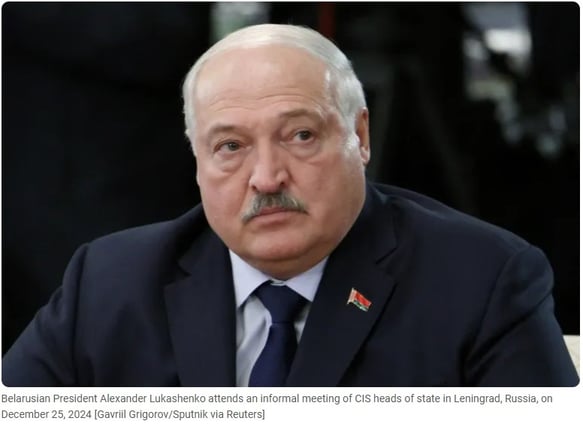Belarus Presidential Election: Lukashenko Aims for Seventh Term Amid Criticism and Global Scrutiny
President Alexander Lukashenko will be running to secure a seventh term, hoping to extend his 30-year rule over Belarus.
NEWSVIRAL


Belarus Presidential Election: Lukashenko Aims for Seventh Term Amid Criticism and Global Scrutiny
Belarus is holding its presidential election on Sunday, as President Alexander Lukashenko seeks to extend his 30-year rule with a seventh term in office. Widely known as "Europe's last dictator," the 70-year-old leader has maintained a firm grip on power, silencing dissent and eliminating opposition.
Lukashenko's Unopposed Campaign
Unlike previous elections, Lukashenko has not actively participated in campaigning. Speaking to factory workers last week, he admitted, “To be honest I don’t follow it. I simply don’t have time for it.” This nonchalant approach reflects his confidence in the outcome, given the suppression of opposition and control over state mechanisms.
The last presidential election in August 2020 led to widespread protests after Lukashenko was declared the winner with 80.1 percent of the vote. His main challenger, Sviatlana Tsikhanouskaya, claimed the results were rigged. She was forced to flee the country, and protests were met with brutal crackdowns, resulting in thousands of arrests and mass detentions.
Timing of the Election
Originally planned for August 2024, the election was moved to January, which analysts believe was a strategic decision. Belarusian political analyst Valery Karbalevich noted that “there won’t be mass protests in freezing January,” implying that cold weather might deter public gatherings and demonstrations.
Election Logistics and Voter Turnout
Polling stations opened at 8:00 am local time and will remain open until 8:00 pm. Results are expected by February 5, with a possible second round on February 12 if no candidate secures a majority.
The state news agency BelTA reported a 27.15 percent voter turnout after three days of early voting. An opinion poll claimed 85.5 percent of registered voters intend to participate, but skepticism remains about the integrity of these figures.
Opposition and Candidates
With key opposition figures either exiled or imprisoned, Lukashenko’s victory seems inevitable. Four other candidates are running:
Oleg Gaidukevich: Leader of the Liberal Democrats, advocating for "healthy competition."
Sergei Sirankov: Representative of the Communist Party.
Anna Kanapatskaya: A former parliamentarian who ran in 2020.
Alexander Khizhnyak: Chairman of the Republican Labour Party.
However, none of these candidates have openly criticized Lukashenko, leading experts to label them as symbolic participants. Tatsiana Chulitskaya, a Belarusian academic, remarked, “These are not candidates in the normal sense. They are just playing along in this campaign.”
Memories of 2020 Protests
The 2020 election aftermath saw mass protests, with accusations of electoral fraud triggering a nationwide outcry. Protesters faced severe police violence and over 3,270 convictions for participating in demonstrations. Human rights group Viasna reports that Belarus still has over 1,200 political prisoners.
Recently, Lukashenko pardoned 23 prisoners in what state media called a "humanitarian gesture" ahead of the election. However, critics view this as an attempt to soften international criticism.
International Backlash
The upcoming election has faced widespread international condemnation. Opposition leader Sviatlana Tsikhanouskaya urged the West to reject the results, calling the election a “sham.” She also discouraged Belarusians from protesting, citing the risks of state violence.
The European Parliament passed a resolution rejecting the election, reiterating their non-recognition of Lukashenko as president. Former U.S. Secretary of State Antony Blinken criticized the election environment, stating it lacks fairness due to censorship and the absence of independent media.
Future Implications
With no credible opposition and Lukashenko's tight control over the electoral process, his re-election seems assured. However, the long-term consequences of continued authoritarian rule, combined with international isolation, remain uncertain.
The world watches as Belarus approaches another term under Lukashenko, with calls for democracy, freedom, and human rights growing louder from within and beyond its borders.
